On Aug 4, members of the LGBT community gathered in Entebbe for a series of events including a party, beach parade and film screenings. The police raided the first Ugandan pride gathering on Aug 4 and 10 people were reportedly detained by police, according to 76crimes.com, a blog which focuses on the "human toll of 76 countries’ anti-gay laws and the struggle to repeal them."
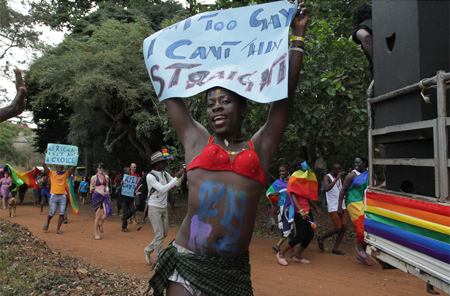
Celebrating at Uganda’s first pride parade.
(Photo courtesy of RachelAdamsPhotography.com)
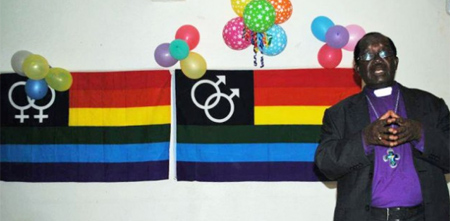
Frank Mugisha, executive director of Sexual Minorities Uganda, speaks at the pride
event before the police arrived. (Photo by David Robinson)
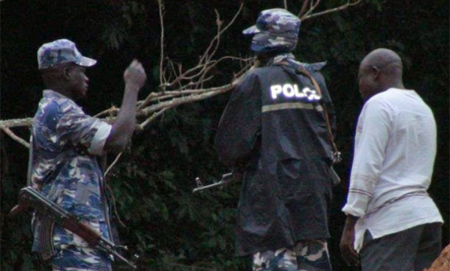
Police arrive to break up Ugandan “Beach Pride” event on Aug 4.
(Photo by David Robinson)
76crimes.com reported:
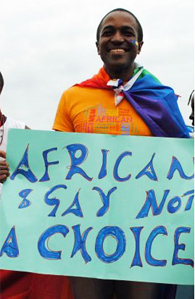
"Among those detained was Jamaican activist Maurice Tomlinson, who was being honored as grand marshall of the event."
The film-making team behind the documentary “Call Me Kuchu” quoted Ugandan activist Frank Mugisha as posting on Facebook “right now detained at entebbe police but we wont give up.”Tomlinson was quoted as saying: "I had the privilege of being the Grand Marshall for the first ever Uganda Pride held in Entebbe today, August 4, 2012. As a result, I got my first ride in the back of a police van! This happened when the festive event was broken up after a police raid and I was detained for assisting a 60 year old woman climb into the back of the police van after police officers refused to help her!"
“They didn’t give up, and the good news is that it seems that everyone has been released and Uganda PRIDE continues. As always, we are amazed by the courage and determination of Kampala’s kuchus [LGBTs]. A luta continua!!” the team added.
Tomlinson added: "After a very confusing and utterly disgraceful performance at the station by the police (including the officers insisting we all sit on the bare floor until we were processed, one officer pushing a young female to the floor and another verbally abusing the 60 year old female anthropologist from Makerere University) we were all released without charges or an explanation. The police also detained a female British photojournalist covering the event. She was only released after a UK army officer came to the police station.
"The Pride March had a truly carnival atmosphere and was spoiled by the arbitrary action of the police. None of the other beach goers complained about the events at the march as there was nothing to complain about!
"Everything was done very tastefully as the organizers were aware that it was a public beach and many young children were around. Many parents even brought their kids over to hear the music and listen to the few speeches and share in the jubilant atmosphere. The Pride organizers even shared food and drinks freely with the onlookers.
"...This firsthand exposure to the Ugandan police system gives me even greater respect for the tremendous work [Uganda activists] do under seemingly impossible odds. Apparently, this kind of arbitrary police action is regular.
For more photos of the celebration, parade and raid, see the blog post “Photos: Police raid Uganda pride celebration.”
Photographer Rachel Adams wrote an account of her experience photographing, covering and being arrested at the first Uganda Pride event on Aug 4 on 76crimes.com:
She contacts the organizers of the pride events:
I go to the Freedom to Roam Uganda office (a well-established lesbian organisation running the Pride event) to get my Pride ticket. Hidden behind metal gates on the outskirts of Kampala, it is a safe place for people like Stosh, who was not only correctively raped as a teenager, but also hounded out of her community and forced to live in hiding because she is gay… As Pride weekend approaches, I hear conflicting information from everyone – that police know about the event, that they don’t, that it will be safe, that it won’t…
She interviews anti-gay Ethics Minister Simon Lokodo:
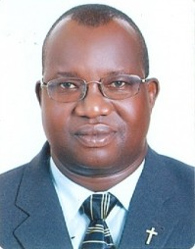
I ask if he thinks people are born gay or if they become homosexual, and he says: "What I know [is] that born or become [sic] it is a perversion. I know it is an ailment. It is a sickness. It is not a status to be applauded. I am told that if a child is in a mother’s womb and there are situations that are negative that person will come out with a negative attitude towards that gender."
Having heard enough I switch off the dictaphone and he asks me what my opinion is. I say that I think that people should be allowed to live freely, to which he replies: "So you think that if people want to go round killing each other they should be allowed to? You know if you are one of those people I would take you straight to the airport." I don’t tell him I’m gay because I don’t want to miss Pride the next day.
She attends the pride parade near the beach in Entebbe:
Gradually the parade gathers momentum and before long all I can see are faces ecstatic with what I can only assume is a feeling of freedom. Dancing becomes wilder and jubilant shrieks reach a crescendo. The scene is one of blissful childlike joy on a background of natural beauty, rainbow colours flitting around in gleeful high visibility. Finally I’ve found the beauty I’ve been wanting to photograph. As the parade makes its way round the gardens a few onlookers gather and soon a group of small children is following the parade, holding hands with some of the participants, unaware of the event’s historical significance.
She is arrested:
Suddenly Morgan approaches me and takes me to the top of the hill. ‘The police are here,’ he whispers. I look around. There are a few men in combats and a white truck stationed near the path. … A man in a white t-shirt and baseball cap comes up to me. He asks what I’m doing there. I say ‘Nothing,’ and carry on eating. He asks me who I am, where I’m from. He keeps on questioning me, enough for me to ask him who he is. He gets out some ID from his pocket and flashes it in my face like a TV cop. I notice an official-looking symbol and the name Ivan. … He tells me he is arresting me so I ask why. No response. …… Ivan never gives a reason. I ask to see his ID again and he refuses to show it. We all ask several times, and he refuses. Despite arguing and trying to persuade this man for about half an hour, he won’t back down. At one point he pushes me in frustration. A female police officer arrives, and when the group tries to hold me back, she hits them with her baton. She bustles me off, and I ask her why I’m being arrested. ‘Homosexuality is illegal in Uganda,’ she whispers conspiratorially.\
Along with many other detainees, she is questioned, then released:
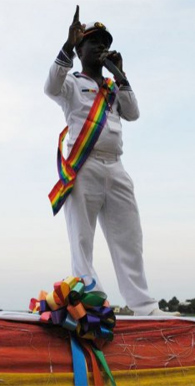
Looking ahead:
The fact that four days of Pride events took place is a huge achievement and an admirable show of bravery for all those involved, but widespread evangelical and institutionalised homophobia informs society to the point that many LGBTI people in Uganda live in constant fear of persecution. A few days after Pride, as I watch pictures being posted and gushing comments of ‘We did it!’ I feel a sense of relief that the aftermath of the event is on the whole positive. … I’m thrilled to read that next year, the march will start from the police station. I hope I can go.
These reports have been republished with permission from 76crimes.com. A detailed account can be found on www.racheladamsphotography.com. Note: The published photos show only the police and people who have been prominent in LGBT rights activities. Photos showing identifiable likenesses of other people have been withheld from publication to protect them from potential reprisals.
